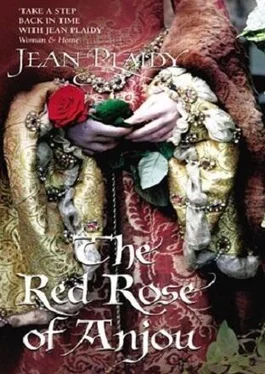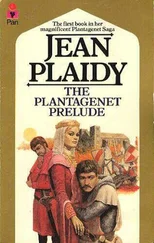Although he was closely guarded he could go where he liked within the castle and he found pleasure in the chapel where there was a great deal of glass some of which had been decorated with exquisite paintings. René was a painter of some ability; he was also a poet and a musician; how often had he deplored his inability to devote himself to these activities which he loved. Now here was a chance. He had so much admired the paintings in the chapel that he would like to paint on glass himself. Glass was found for him and paints provided and in a short time René was passing the days of his captivity in a very pleasant fashion.
Time flew. He had completed a portrait of the late Duke John of Burgundy, who had been known as the Fearless; and so pleased was he with it that he did another of the Duke’s son, the present Duke Philip.
He then painted miniatures of other members of the family and looked forward to each day when he could continue with his work.
When he heard that the Duke of Burgundy had announced his intention of visiting Dijon he scarcely heard the news; he was so intent on getting the right texture for the hair of the subject of one of his paintings.
Duke Philip arrived and expecting to find an abject René of Anjou begging for his release was surprised to find the captive intent on his work.
The Duke looked at the painting. ‘Why it is beautiful,’ he said. ‘I had no idea you were an artist.’
‘Oh,’ said René modestly, ‘it passes the time.’
He talked of the way he mixed his paints and the subjects who pleased him most.
‘You seem to have found an agreeable way in which to spend your captivity,’ said the Duke.
‘An artist,’ explained René, ‘can never truly become the captive of anything but his own imagination.’
‘So an artist can be content wherever he is.’
‘While engaged in the act of creation most certainly.’
‘It seems to me you do not find all this in the least irksome.’
‘At times, yes. I should like to be with my family. My children are growing up, you know, and it is always a joy to see them changing. But while I paint my work engrosses me. It is so with artists.’
The Duke was amazed. There could not be a man less like himself. It was not that the Duke was not a highly cultured man. He was. He loved beautiful things, but first and foremost he was the Duke of Burgundy and his main object in life was to uphold his power and increase it.
But he was greatly impressed by René’s work and when he saw the pictures which his prisoner had painted of Duke John and himself he declared that they were very fine indeed and should be placed in the window of the chapel.
‘You embarrass me,’ he said. I do not care to hold an artist such as you captive.’
‘There is an easy remedy for that,’ said René with a smile. ‘Let me go free.’
‘Now you know that is not possible. There are conventions to be observed in matters like this. If I freed you without conditions I should have every prisoner I take claiming to be an artist.’
‘That is a matter, my lord Duke, which could be put to the test.’
‘The appreciation of great art is an individual matter. I should be told that my prisoner was a great artist but of a different school from that which I admired. You see my difficulties.’
‘I do, my lord.’
‘On the other hand,’ said the Duke, ‘I would discuss terms with you. You were captured in battle. The dispute over Lorraine has to be settled. Who has the prior claim—you as husband of Isabelle or Antoine de Vaudémont! Are we to enforce the Salic Law or not? I can see an easy settlement to that dispute.’
‘I should be glad to know it.’
‘You have a daughter, have you not?’
‘Two. Yolande and Margaret.’
‘It is of the elder I would speak.’
‘That is Yolande.’
‘My dear man, Antoine has a son, young Ferri. Why should not these two be betrothed? In time Antoine’s son and your daughter would inherit Lorraine. Would you agree to that? I ask you this, but at the same time I must remind you that you will remain a prisoner until you do.’
‘It seems a fair enough solution,’ said René.
‘Then that will settle the main dispute. But naturally there must be a ransom. Certain castles shall we say?’
‘Which?’ asked René.
‘Clermont, Chatille, Bourmont and Charmes?’
‘You strike a hard bargain.’
‘And twenty thousand gold crowns.’
‘Twenty thousand gold crowns! Where shall I find them?’
‘You will have time to find the money. I should advise you to agree. Ransoms have a habit of increasing with the years. I am being lenient. You must admit. It is because of the respect I have for an artist.’
When the Duke had gone René considered the matter. He wanted to be with his family. He longed to see the children. It was true that little Yolande would doubtless be expected to join the Vaudémonts. Well, that was the sort of thing that happened to girls.
He agreed and very soon after was speeding on his way to join his family.
* * *
After René had been warmly greeted by his family both Isabelle and her mother considered the terms of his release and declared that they were very harsh.
In the nursery, Theophanie was fuming.
‘A nice state of affairs,’ she said. ‘A little mite like my Yolande to go off and live with strangers. Her cousins they may be, but it’s not right. It’s not right at all. And Agnès. Who would have believed that? A Maid of Honour eh, to the Queen. I reckon she’ll be pining for her nice place in my nurseries before very long. Agnès at Court! I can’t see it. I can’t see it at all.’
But the real tragedy was of course the departure of Yolande.
It was a mercy, she muttered to herself, that the child was so young...too young to realize. She was only four years old, poor mite. She was asking a great many questions about her new home.
‘As if I could tell her,’ mourned Theophanie.
Margaret looked on with wide eyes. ^
‘Why is Yolande going away?’
‘Because she’s going to be betrothed.’
‘What is betrothed?’
‘Married, in time.’
Theo, shall I be betrothed?’
‘You certainly will, my lamb.’
‘Is it a good thing to be?’
‘It’s sometimes very good...for others,’ added Theophanie bitterly.
The boys were interested. ‘You’ll have to go one day, Margaret,’ they taunted her.
Yolande was half sorrowful, half proud. She was after all the centre of the activity. She had to have new clothes and was given special lessons on how to behave.
It was particularly hard that she should have to go now that their father was home. When Margaret pointed this out to Theophanie she said somewhat mysteriously: ‘Well, it’s just because...’
And try as she might Margaret could get no more out of her.
In due course Yolande went away and Margaret missed her very much although her father was with them again and that made life very pleasant. He had changed. There was a scar on the left side of his forehead which was where the arrow had struck when he had been captured by the Maréchal de Toulongeon which was the reason why Yolande was no longer with them.
René was very different from their mother. He liked to be with them. He would paint and sing and read poetry and that was very interesting. He talked to them all about how he had been captured and had painted on glass in the Château of Dijon; he was entirely frank with them and he was giving them all an interest in music and poetry.
‘It is well enough,’ said the Dowager Duchess Margaret who was with them. ‘They will be cultivated; but we must not forget that they must learn other things besides an appreciation of the arts.’
Читать дальше










